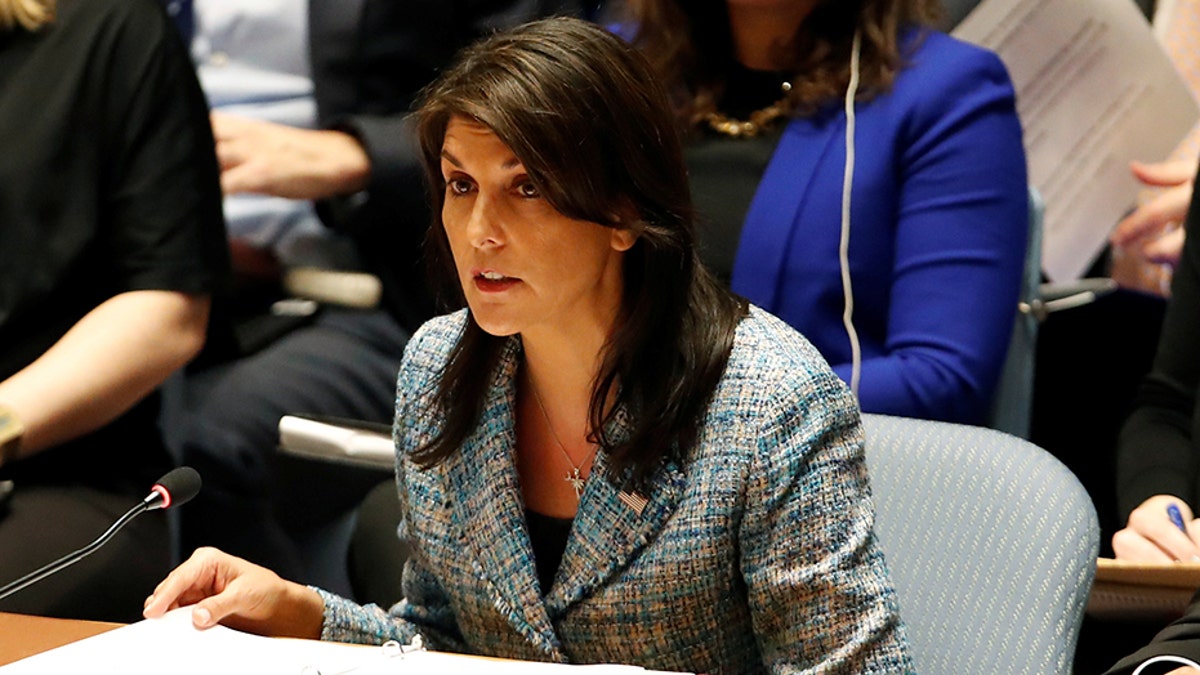
The U.S. voted against a General Assembly resolution condemning Israel's presence in the Golan Heights (Reuters)
The U.S. on Friday voted against an annual resolution condemning the “occupation” of the Golan Heights -- a change from the U.S. decision to abstain in 2017-- and ripped into the body’s alleged anti-Israel bias, part of an increasingly pro-Israel stance under the Trump administration.
The resolution passed 151-2 (with 14 abstentions) and came as part of a broader package of anti-Israel resolutions that passed a marathon General Assembly committee hearing on Friday morning. Israel captured the Golan Heights from Syria during the 1967 war in the region and later annexed it. The move has been repeatedly condemned by the U.N.
The non-binding resolution, sponsored by countries including Cuba, North Korea, Saudi Arabia, Syria and Venezuela, describes Israel's presence as an illegal occupation and calls on Israel “to desist from changing the physical character, demographic composition, institutional structure and legal status of the occupied Syrian Golan and in particular to desist from the establishment of settlements.”
The U.S. voted to abstain last year, but this year voted no, along with Israel, and cited the resolution’s anti-Israel bias, the militarization of the Syrian Golan border, and a worsening humanitarian crisis as reasons for the change in the vote.
UN'S SCATHING REPORTS STOKE US CONCERNS ABOUT ANTI-ISRAEL BIAS
U.S. Ambassador Nikki Haley on Thursday called the resolution “useless” and said if it ever made sense “it surely does not today” amid the atrocities by the regime of Syrian President Bashar al-Assad.
“The resolution is plainly biased against Israel. Further, the atrocities the Syrian regime continues to commit prove its lack of fitness to govern anyone,” she said in a statement. The destructive influence of the Iranian regime inside Syria presents major threats to international security. ISIS and other terrorist groups remain in Syria. And this resolution does nothing to bring any parties closer to a peace agreement. The United States will vote no.”
U.S. Political Advisor Samantha Sutton, in remarks to the committee on Friday, said that U.N. resolutions frequently blame Israel for problems in the region, without mentioning terrorist acts by Hamas. She also urged countries to focus on issues of genuine urgency in the region rather than “grandstanding against Israel.”
Israeli Ambassador Danny Danon welcomed the U.S. move and called it “another testament to the strong cooperation between the two countries.”
“I thank Ambassador Haley for her continued steadfastness with Israel and the truth. It is time for the world to distinguish between those who stabilize the region and those who sow terror,” he said in a statement Thursday ahead of the vote.
On Friday, Dannon was defiant and told the committee that Israel will not withdraw from the area: "Israel will not withdraw from the Golan Heights, it is time the international community accepts it.”
The U.S. does not recognize Israel’s claim to the territory but U.S. Ambassador to Israel David Friedman said in September that he could not imagine a situation where it is returned to Syria.
Sen. Ted Cruz, R-Texas, said Friday that “it’s past time to acknowledge the reality of Israel's sovereignty over the Golan Heights, which should never come under the control of the Iran-backed Assad regime.”
Syria meanwhile hailed the vote and said the U.N. had sent a message that Israel was in “violation of the provisions of the [U.N.] Charter and of international law.”
ISRAEL, HALEY ACCUSE UN OF IGNORING ATTACKS BY 'TERRORIST FLAMING SWASTIKA KITES'
The U.S. has been increasingly vocal at the U.N. in backing its closest ally in the Middle East, and pushing back against anti-Israel bias at the U.N. This year, the U.S. withdrew from the U.N.'s Human Rights Council, in part because of the anti-Israel bias, and has also frozen funding for the U.N. Palestinian refugee body (UNRWA).




